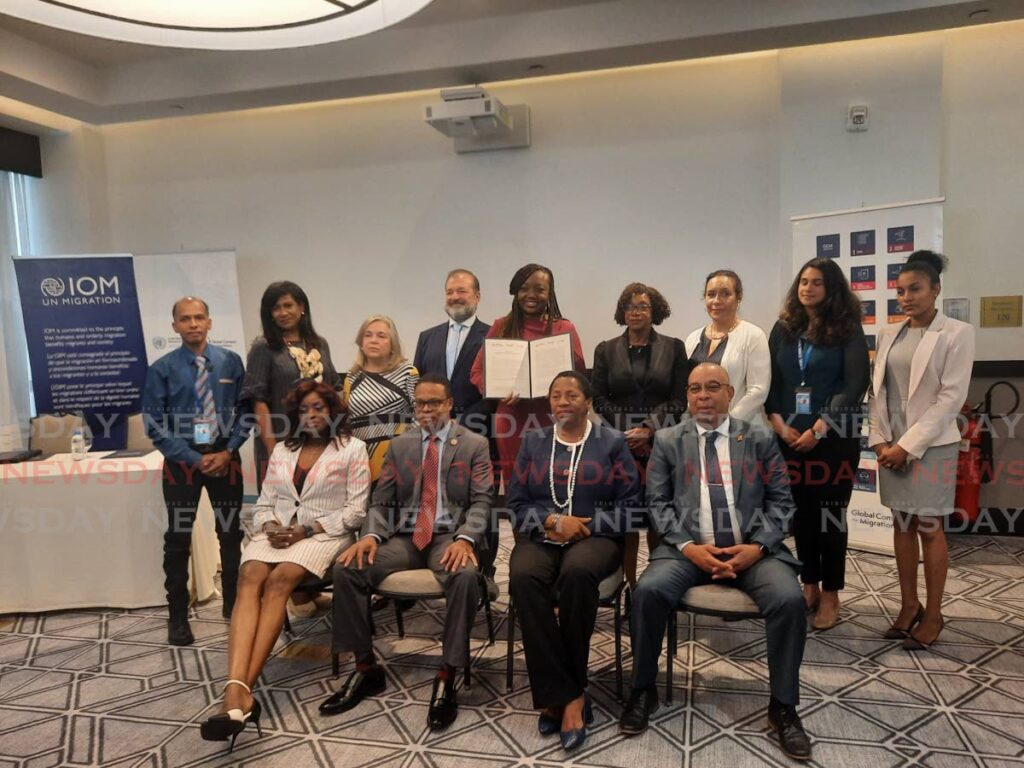UN agency to help Trinidad and Tobago manage migrants

Foreign and Caricom Affairs Minister Dr Amery Browne said he appreciated the assistance the UN Network on Migration TT (UNNM-TT) would be able to give the government in managing the flow of migrants into and through the country.
He was speaking at the launch of the initiative on Monday at the Brix Hotel, Cascade.
The Global Compact for Safe, Orderly and Regular Migration (GCM) was adopted worldwide in 2018, and local and regional migration mechanisms were formed as part of this agreement under the responsibility of the International Organisation for Migration (IOM).
Browne said the number of migrants worldwide has grown dramatically as people flee famine, poverty, warfare, sometimes persecution and political turmoil, while many also seek improved circumstances for themselves and their families.
“As countries that become migrant destinations expand, the need for co-ordinated and collaborative efforts among countries and organisations becomes more urgent than ever before. No one entity can manage migration globally, including the TT government, especially if the ultimate aim is to ensure the safety of migrant populations, the manageable accommodation, integration and facilitation of new beginnings for those who had to leave their homeland, and support for systems in the countries they transit and the countries that receive them.
“I consider the work of the IOM, safeguarding the rights of migrants and providing assistance to source, transit, and destination countries, to be particularly crucial at this time. Collaboration between the PoS IOM and my ministry is therefore a matter of tremendous importance, constituting part of our commitment to regional integration efforts such as Caricom and regional instruments such as the GCM.”
Browne said facilitating the movement of people is an imperative for TT and the region.
“Unregulated flows are often impractical and have negative social, economic, and security impacts. As we seek to engage with partners to ensure that the delicate and problematic balance between managing the wellbeing of migrants and the perhaps unavoidable domestic concerns as a destination country is properly developed and maintained, the concerns of all constituents within the framework of migration must matter. TT welcomes the inception of the UNNM-TT and eagerly anticipates the support this partnership will bring to capacity-building, knowledge-sharing, information collection, data analysis, and the development of the national action plans.”
UN resident co-ordinator Dennis Zulu said the UNNMTT would lead to a more co-ordinated approach to migration, as the project would take into account specific factors unique to TT.
IOM PoS project manager Zeke Beharry said migration will not slow or stop, so it needed to be strategically managed to facilitate orderly, safe, responsible, and regular migration.
He said the UNNM-TT would co-ordinate the responses of 15 UN agencies and NGOs, with space for any other interested UN agencies. He said the network would encourage the government to endorse the GCM, support the implementation of the 26 GCM objectives, implement capacity-building activities that support the government in strengthening the approach to migration in TT, and ensure a comprehensive understanding of the evolving migration dynamics and provide leadership for a co-ordinated and collaborative approach to action to migration in TT.
Colombian ambassador Martha Pinilla-Perdomo said in Colombia, the International Organization for Migrants in Bogota supported the establishment of a network similar to the UNNM, and the country is seen as a model one for migrants and migration matters. She said it has facilitated the management of at least two million Venezuelans living in diverse regions of Colombia who need to be integrated into the society.
“Migrants are characterised for being creative and having the strength to be able to go to a new world, capable of executing their ideas. Many of them are well educated in technical and professional knowledge that may supplement the local capacities. They are also consumers and taxpayers if they are regularised.”
She said it’s a win-win situation if the receiving countries and their national institutions, as well as expert NGOs and the international community which manages the different aspects of migrant implications, are able to work together harmoniously.
Pinilla-Perdomo said substantial migration brings new challenges in diverse areas such as registration, temporary shelter, emergency health services, feeding, regularisation, housing, public utilities, labour, education, and permanent health services, which makes a co-ordinating mechanism even more important.
“An organised migration system to receive and integrate those who for diverse reasons have had to leave behind their countries, belongings, friends, and in many cases, their families, gives them back their dignity as the human beings they are, assuring them their respect and guaranteeing them their human rights.”

Comments
"UN agency to help Trinidad and Tobago manage migrants"